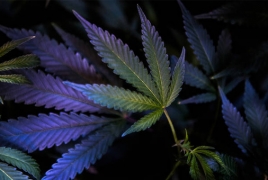Genes that could make you more likely to try cannabis: research August 29, 2018 - 12:27 AMT PanARMENIAN.Net - Laws regarding marijuana use are changing even as scientists are still trying to understand why people use it and the overall effects of using it. Now, a study is wading in by examining how genetics influences people's tendency to try pot. But the study raises nearly as many questions as it answers, and the overall effect of genes appears to be extremely small, Ars Technica says. Genes and weed This isn't the first study to look at marijuana use, but the history here is a bit murky. Many of the past studies are small, and they've looked at different things: some at whether a person has ever tried the drug and others at factors that influence whether a person becomes a heavy user. Still, twin studies have indicated that genetics plays a large role in determining whether someone is likely to try the drug at some point in their lives. The new work is largely a follow-up on that, involving a search for the specific genetic factors that influence what's termed "lifetime use"—the decision to try pot at least once in someone's life. The researchers behind it are a mix of 23andMe staff and members of the International Cannabis Consortium (which is less interesting than it sounds). Both groups focus on scanning the entire genome for variations linked to specific traits. For this, they combined 23andMe data with several public genetics resources that have asked their participants about cannabis use. Combined, these data sources included about 185,000 individuals, making this the largest study of its kind. And it came up with... not a whole lot. Eight regions of the genome stood out, but collectively they only accounted for about 11 percent of the total variance in whether people would try pot. Gene-focused analysis identified more than 20 genes in these regions that could influence this decision as well. One of the odd findings, however, was that the genes identified in previous studies mostly didn't come up here, and a number of the genes identified here hadn't previously been implicated in this issue. So, to an extent, this paper has some questions about its replicability even as it was published. The authors explain that through differences in the populations sampled: "the different samples varied substantially regarding the age of the participants, the prevalence of cannabis use, and the country's policies regarding cannabis use." Which brings up another issue: the decision to try out pot is probably largely a social one. Social influences For example, one of the genetic databases, in addition to having information about cannabis use, includes data on things like household income and standardized tests. And the cannabis users there tended to be better off and have higher fluid intelligence scores. "Possibly, environments more often experienced by those with backgrounds of higher social economic status, such as universities," the authors suggest, "increase accessibility to cannabis." And, to a certain extent, that's borne out in the genes. The single strongest location in the genome associated with trying cannabis is a gene called CADM2. It has come up in searches for things associated with substance use before, and it has also been linked to reduced anxiety and increased risk taking. So, if you're into new sensations and not too uptight about doing something that may be illegal, it would be somewhat surprising if trying pot didn't show up on your to-do list. The remaining genes are often associated with various forms of substance abuse and various psychiatric disorders. Which brings us to a final point. Heavy cannabis use has been associated with schizophrenia, but the direction of the causality (if any exists) hasn't been clear. It's possible that cannabis use can induce schizophrenia, but it's equally plausible that people prone to schizophrenia have personality traits that could cause them to abuse the drug. Genes associated with schizophrenia risk did come out of this screen, even though it focused on casual pot use. So the authors attempted to test for a causal connection between the two. Their results indicated that it's very unlikely that pot use causes schizophrenia. And, while there was some support for the idea that schizophrenia predisposes one to trying pot, the support was weak, and the authors suggest it might go away with a larger dataset. All of which leaves us with a somewhat limited picture. While twin studies suggest a significant role for genetics in influencing trying pot, this study suggests that the total effect is pretty small and that each individual gene has a tiny influence on the decision. That suggests that much of the influence is social, and many of the genes that came out of this work support that idea, as they have general influences on behaviors that could motivate someone to try pot. That raises the possibility that the changing legal landscape of marijuana use may also change the importance of the genetic factors that influence this decision. The work doesn't focus on what may be the more important question of why some individuals end up using cannabis heavily and how that ends up connected with schizophrenia. Azerbaijani authorities report that they have already resettled 3,000 people in the Nagorno-Karabakh town of Stepanakert. On June 10, Azerbaijani President of Azerbaijan Ilham Aliyev will leave for Turkey on a working visit. Azerbaijani President Ilham Aliyev arrived in Moscow on April 22 to hold talks with Russian counterpart Vladimir Putin. Authorities said a total of 192 Azerbaijani troops were killed and 511 were wounded during Azerbaijan’s offensive. Partner news |